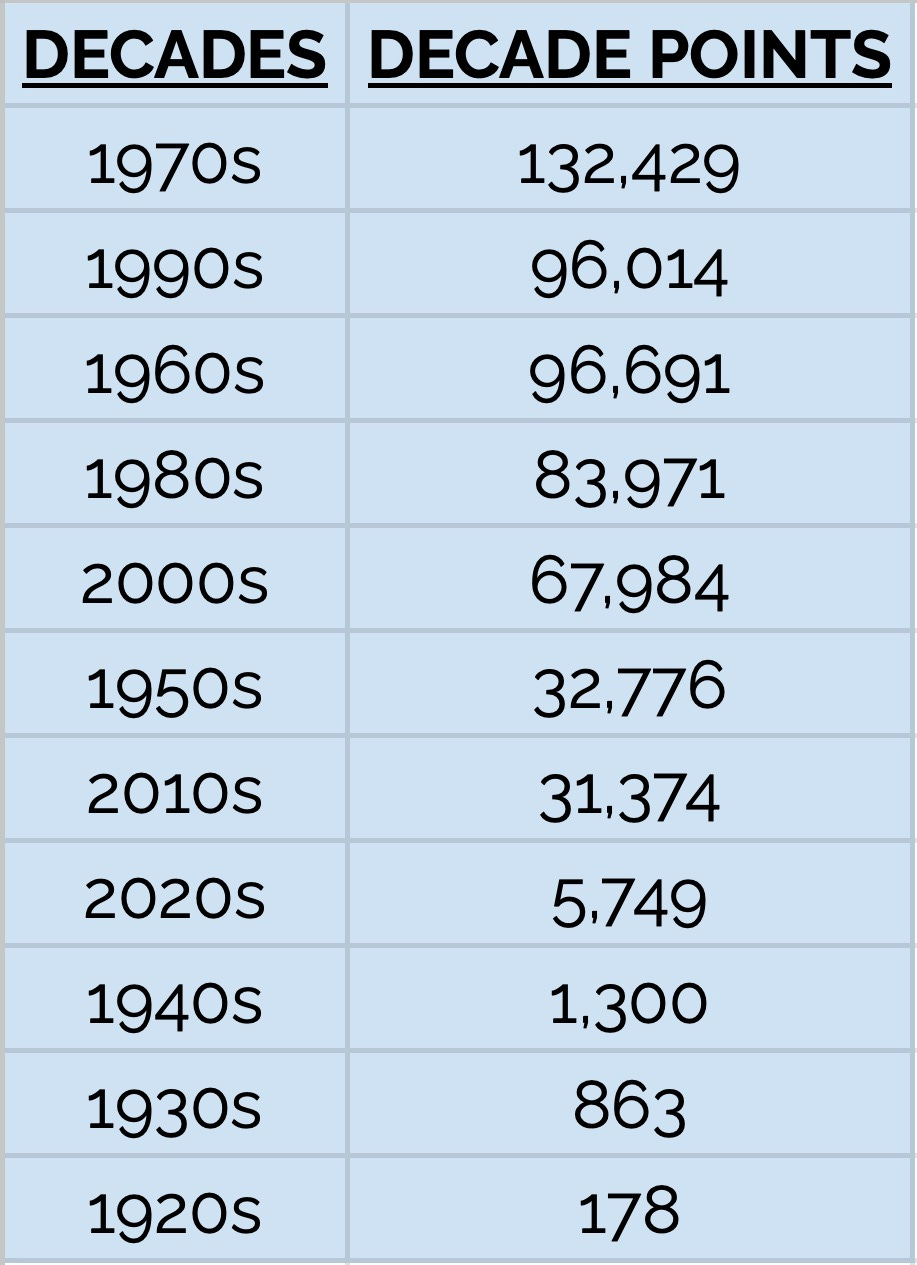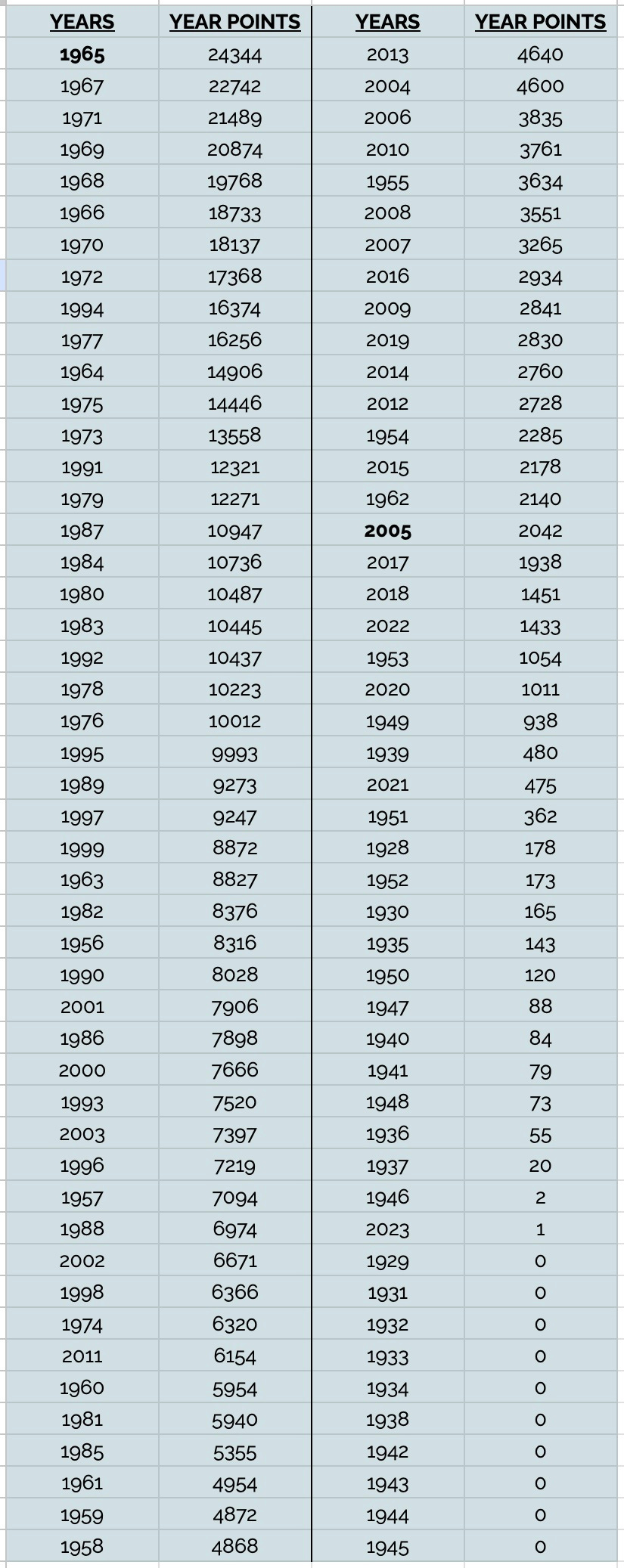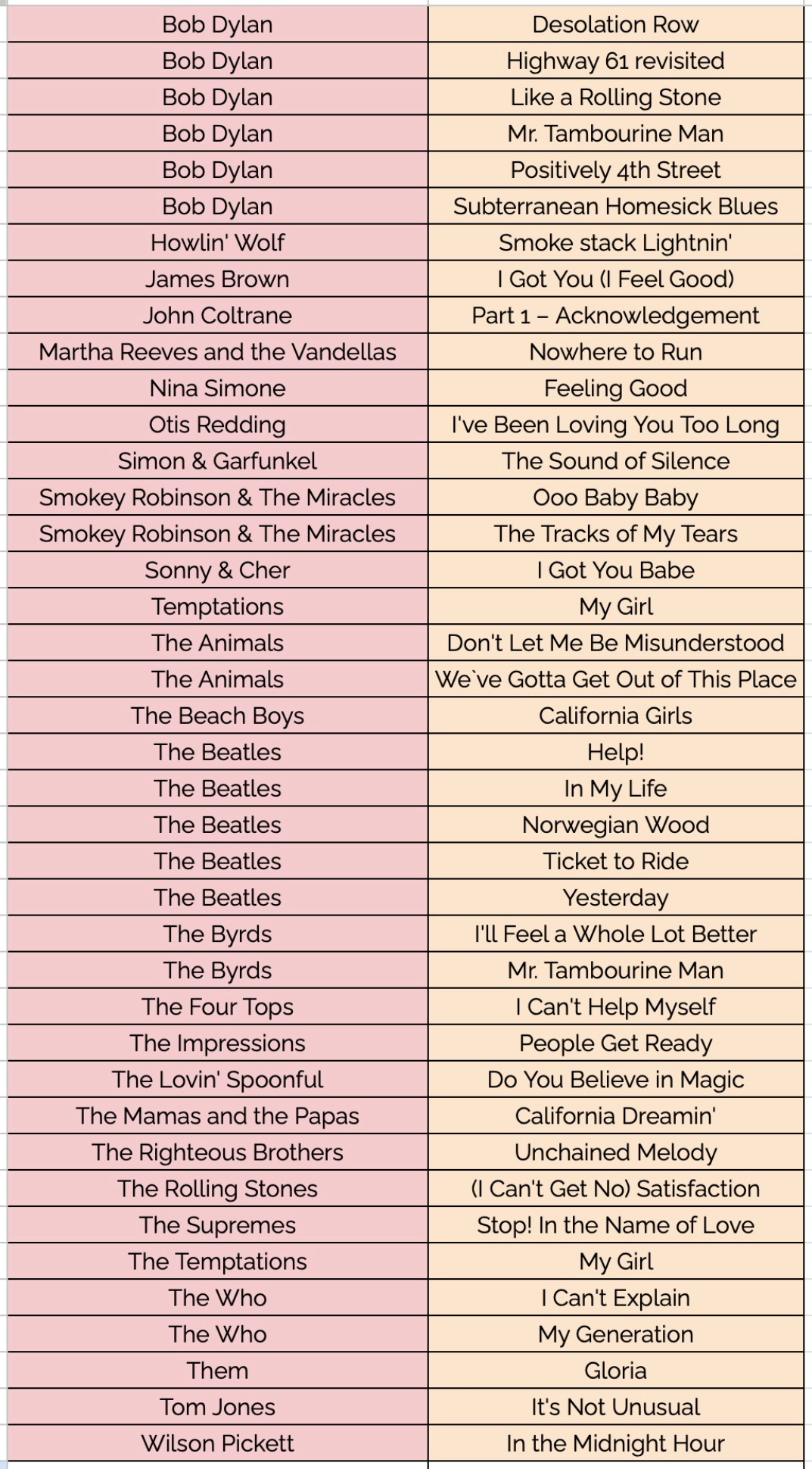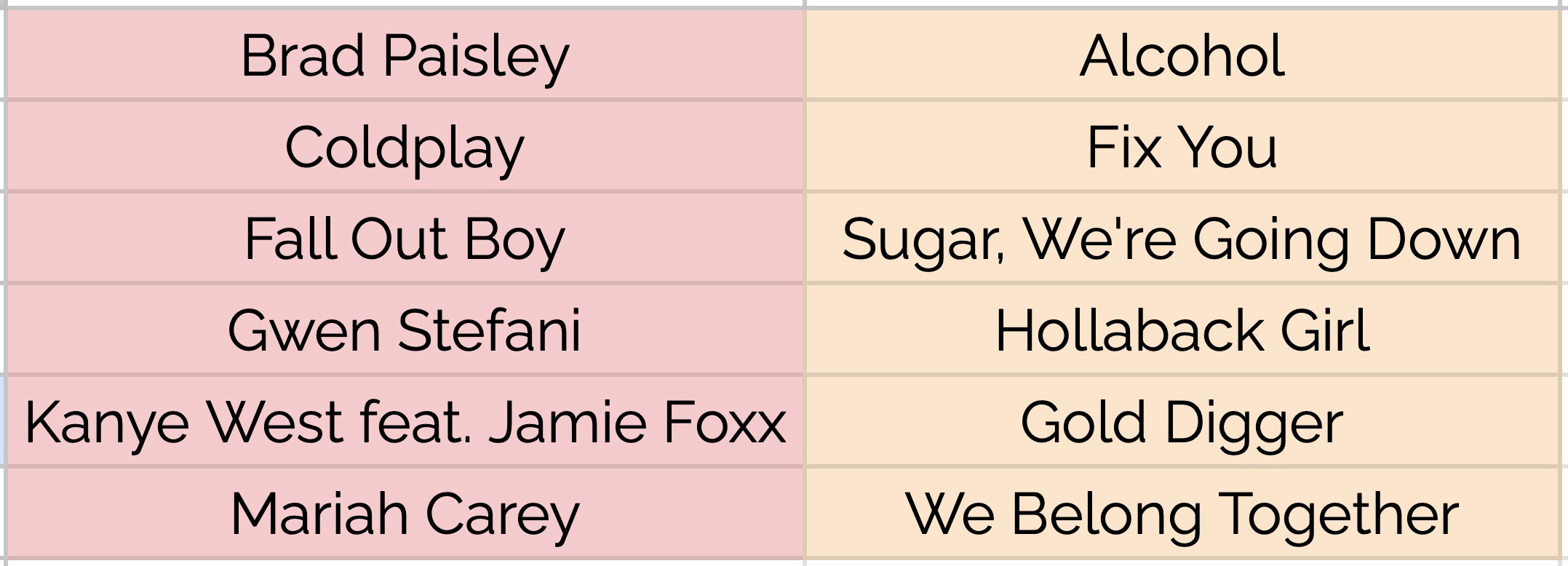The Best & Worst Years for American Music
A Big Data Approach to One of Life's Most Pressing Questions
Intro
As Saturday Night Live celebrates its 50th year, many of us lament how much funnier it was “back then.” When is that?
The creator himself, Lorne Michaels, observed: "Just about all viewers of 'S.N.L.' believe that its funniest years were the ones when they were in high school."
And so it is with music. But what if we took an unbiased approach? Because I don’t have enough to balance in my life with my standup career, my marriage, my Mom moving in with us after my Dad’s passing, and my three-year-old wandering around our house, I set aside 20 hours of my life to do a deep dive, sometimes using A.I. but mostly using Google and Reddit, into this all-important topic.
Upon completion, I ran my method by the friends of mine known to be the harshest critics. I did NOT initially share the results because I wanted them focused on the process. Gut-checks are intuition, which includes our personal biases for and against different periods of music. I wanted them to remain in their heads. All of these hard skeptics concurred with my approach.
(If you don’t know who I am, then perhaps any people I know personally aren’t exactly going to fill the credibility gap. As my friend Erin Tillman (The Dating Advice Girl) once said, “I often have these guys come up to me at a bar who vouch for their friend. How does that hold any water? I don’t know who YOU are.”)
Methodology
Data Collection: Using a spreadsheet, I placed 11 top lists, including sources like Rolling Stone's 500 Greatest Albums and Billboard's 500 Greatest Songs.
Assigning Values: I assigned value to each ranking, so the top-ranked song/album received 500 points, and the last-ranked song received one.
Sorting by Year: I sorted by year and tallied up all the points for each year.
Ranking Years: Finally, I sorted the years in descending order to see which one's at the top and which one's at the bottom.
Here’s what page 1 of 142 (!) pages looks like.
Challenges
Naturally, here are some of the potential issues with this method:
Subjectivity of Lists: These lists are opinion-based. After all, the Rolling Stone or the VH1 board is making the selections. Even if we go by sales, like Billboard (which shifted its counting in the 1990s), this still reflects the opinions of a large quantity of people. That said, so many opinions in aggregate can be considered data, which falls into the logic camp.
Temporal Bias: These lists were mostly made between 2003 and 2023, so they're biased toward older stuff. That said, I don't think a lot of people are arguing that the best music ever has been made in the last 20 years. Anecdotally (which I grant doesn't fall into the logic camp), I can confirm this from my Zoomer friends, some in entertainment and some who are kids of my Gen X friends. Even they admit the classics are classics for a reason.
Influence of Politics: Politics started to infect everything in this country around 2015. Sure, some of it was always there, but nothing like this current era. It began to permeate pop culture. "Oh, you eat at Chick-Fil-A? You must hate queers." "Oh, you drink Bud Light? You must despise Trump." The same is true with these lists. They "corrected" a lot of them, including a lot more entries from PoC, women, et al. — not only from more recent years but also throughout history. Are the lists better? That's beyond the scope of this discussion, but suffice it to say they're different.
Genre Inclusion: I included Rolling Stone's Top 100 Hip-Hop, Top 100 Country, and Top 300 Modern Rock lists. (Of course, there's overlap in all of these lists, but that's a feature, not a bug. The more lists a song appears on, the greater it is.)
I didn't include a rock list since, scrolling through the spreadsheet, it seemed like rock was adequately represented. (Modern rock is more commonly known as Alt, but I'm thrilled they called it "modern rock," as that's what I still call it.)
Omission of Certain Genres: I left out genres like metal, jazz, and the blues. Though metal is technically separate, it's fairly well captured in rock. Though I personally love jazz and the blues, I think it’s safe to say they’re not as mainstream.
Inclusion of Albums: I included albums. Naturally, those don't always contain songs that everyone knows. You’re welcome to check out the Without Albums tab.
Data Sourcing: How did I import the data into the spreadsheet? My source material couldn't have been from the Rolling Stone site, for example, as it's impossible to copy-and-paste neatly. I relied on the kind souls of Reddit and the blogosphere. As Simon & Garfunkel sang, "The words of the prophets are written on the subway walls and tenement halls." They could've made mistakes, though the comment section would probably have caught them.
Counting: If an album appeared on, say, the 2003, the 2012, and the 2021 lists, I took an average of the three instead of counting them three times. For example, the Beatles' "Sgt. Pepper's Lonely Hearts Club Band" was ranked #1, then #1 again, but then fell to #24. Instead of adding up 500 points + 500 points + 476 points, I averaged it out to an 8.7 and awarded it ~492 points.
Use of AI for Dates: For lists that didn't contain the years, I asked ChatGPT to tell me. It routinely made mistakes so I had to use my own knowledge to watch it like a hawk. "Lust for Life" didn't come out in 1997. I ran it a few times till it all seemed accurate.
Focus on Best, Not Worst: These lists measure the best stuff. In a Dickensian sense, these years might also contain the worst music ever made. But subtracting points based on "Worst Of" lists seemed tedious and unnecessary. Babe Ruth had the most home runs and the most strikeouts and is considered the GOAT.
Validity of Source Lists: Above all else, you might think these lists by Rolling Stone or VH1 or Billboard are terrible. Garbage in = garbage out.
Even with those potential foibles, I don't know if there's a better method to determine this. And if you simply don't feel art should be ranked or are not interested, you don’t need to comment. You can simply move on with your day.
Results
Graph
Here’s a graph of the peaks and valleys of American pop music:
“Oh, I Saw the Decade In” - Jesus Jones
The 1970s won by a large margin. In defense of the earlier part of the 1900s, pop music didn’t really begin until halfway through the 1950s (about the midpoint of the twentieth century).
“Pop” has been defined a few ways. There’s a reason I’m talking about “popular music.” Not all Pop is Popular Music and not all Popular Music is Pop. I like Wikipedia’s take:
Pop music is a genre of popular music that originated in its modern form during the mid-1950s in the United States and the United Kingdom. It is characterized by its wide appeal, often featuring short to medium-length songs written in a basic format, such as the verse-chorus structure, and incorporating repeated choruses and hooks. Pop music often borrows elements from various styles, including rock, urban, dance, Latin, and country. The genre is distinguished from chart music, though much of the music that appears on record charts is considered pop music.
“Reelin’ in the Years” - Steely Dan
Here are all the years, with their corresponding points:
Top Ten Years
1965
1967
1971
1969
1968
1966
1970
1972
1994
1977
The worst years are technically a 10-way tie amongst a bunch of years from the 1920s, ’30s, and ’40s. And recall that we lack rich data for more recent years. So, the one year that seems to stick out like a sore thumb is 2005. It has barely 2,000 points, whereas 2004 and 2006 have over twice that.
Gut Check
Since I’m obsessed with the year 1994 (my own high school graduation year… shout-out, Lorne), here’s that list. Some definite bangers.
1994
Conclusion
The best year for American popular music is 1965.
The worst year for American popular music is 2005.
1965
2005
Resources
500 Greatest Albums - RS - 2003, 2012, 2020
Songs That Dropped Off RS' Greatest Songs from 2004 to 2010
500 Greatest Songs - Billboard
100 Greatest Hip-Hop Songs - RS
100 Greatest Country Songs - RS
300 Greatest Modern Rock Songs - RS
500 Greatest Albums - RS - Compilations
100 Greatest Songs - VH1 (with Genres)
Hope you enjoyed that. What’s YOUR favorite year?
Rock on.
Rajiv Satyal is a comedian and pop culture maven. He resides in Los Angeles with, well, you’ll know if you read the piece.











I refer you to Rick Beato's You Tube titled "The Real Reason Why Music is Getting Worse". Comprehensive, factual. Shows why music really is getting worse.